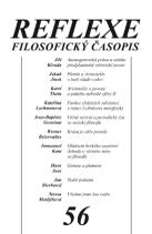Temporality and Authenticity in Sein und Zeit (Some Issues in Heidegger’s Analysis of Time and their Parallels in Augustine)
In its undetermined emptiness of anticipatory “running forth towards death“, the authentic temporality as conceived by M. Heidegger appears to approach Augustine’s extensio towards the eschatological future, insofar as this extensio also implies a desire to rise above the distraction delving in the things of the world. Similarly to Augustine, Heidegger’s unauthentic temporality – as an involvement in these things – makes it possible to measure time and to understand it as the time of passing things. In both authors, the unauthentic temporality seems to be moralized as “decadence” (Verfallen) or distraction. In my re-interpretation, the three moments of time as found in both authors (the authentic and unauthentic temporality of Dasein and the “world-time”) obtain a new meaning based on the valorization of Dasein as being-with (Mitsein) and being-in-the-world (In-der-Welt-Sein) and on the attempt of a non-moral understanding of both the authentic and – especially – the unauthentic temporality.
Backlinks: Reflexe 35
